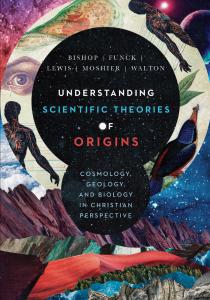 God’s acts in creation but his action is mediated. He generally acts through some intermediary – even if it is just his word.
God’s acts in creation but his action is mediated. He generally acts through some intermediary – even if it is just his word.
Robert Bishop in Ch. 2 of of Understanding Scientific Theories of Origins elaborates on a Christian understanding of God’s action, both in the creation of the universe and yet today. “For God’s action in nature to be mediated means divine activity in creation is shaped by or takes place through something else. That God’s activity in the creation is mediated does not imply any deficiency in power or ability. Rather, this is the intentional pattern of divine action that we see in the Bible.” (p. 22)
Three forms of mediation can be identified in the Bible.
First God acts by divine command. Genesis 1:3 provides an example: “And God said, “Let there be light,” and there was light.” God speaks and his purpose is fulfilled. There is nothing accidental or unintentional here. “And God saw that the light was good.”
Second, God acts through the Son and the Spirit. Very early in Church history Irenaeus referred to the Son and the Spirit as God’s two hands. According to Bishop “the image is meant to emphasize the distinct roles of the three persons of the Trinity, who are always fully engaged in creation.” (p. 23) John 1:1-3 and Col. 1:16-17 provide good examples here. Speaking of Christ the Son , John writes “Through him all things were made; without him nothing was made that has been made.” Paul affirms the same and goes further: “For in him all things were created: things in heaven and on earth, visible and invisible, whether thrones or powers or rulers or authorities; all things have been created through him and for him. He is before all things, and in him all things hold together.” The Spirit is hovering over the water in Genesis 1:2 and involved in the continuing creation of animals in Psalm 104:27,30 “All creatures look to you to give them their food at the proper time. … When you send your Spirit, they are created, and you renew the face of the ground.“
Finally, God acts through the normal processes of his creation. This is seen throughout Scripture. It isn’t the processes are divided into natural and divine. This is a modern distinction. In Genesis 1 we read “Let the earth sprout vegetation” v. 11 and “Let the earth bring forth living creatures according to their kinds.” (v.24) Bishop elaborates: “the message is that creation is called and empowered to bring forth and sustain varieties of living creatures, but this also is God’s activity-exactly the pattern Psalm 104 praises God for. The Son made the creation creative through the enablement of the Spirit.” (p. 27)
Bishop notes:
This is the pattern throughout the Bible: God’s activity in the creation is manifested through creation, whether animate or inanimate parts of nature. Genesis 1-2 and the creation psalms are filled with examples of divine action mediated ministerially through creation (e.g., reproduction, provision of food and shelter). (p. 29)
God’s action is also mediated through human beings – a “normal” process of creation. God works through Abraham, Israel, and even Babylonians. The spread of the message of Jesus was mediated through Paul and other followers and continues to be mediated through humans today.
It is noteworthy that “this form of mediated action is also crucial to the Christian community’s understanding of the inspiration and authority of Scripture. … God wrote the Scriptures through the agency of human beings enabled by the Spirit.” (p. 29)
These three methods of divine action act cooperatively rather than in competition “… the biblical picture is of all three working in concert. They are interconnected to one another because they all are forms of divine action.” (p. 30)
It is also significant that all of these forms of divine action are ongoing. The Psalmist and the author of Job speak of God’s ongoing action sustaining and providing for his creation. The Christ hymn in Colossians doesn’t stop with origins but continues “in him all things hold together.”
Where does this leave us?
Therefore, there is no biblical warrant for restricting God’s activity in nature to some kind of violation or suspension of creation’s functional integrity. The rich forms of mediated divine activity in the doctrine of creation allow us to see God’s miraculous ways with creation’s functional integrity fully involved in such instances as unexpected healings, timely gifts of money or food that avert the closure of an orphanage, or the avoidance of a near accident. However, mediated forms of divine activity also allow us to see that the Trinity is just as involved in the ongoing workings of gravity, plant growth, and nuclear fusion inside stars (compare Ps 104). It is actually a false choice to think that God is active in nature only when there are miraculous “violations” of the contingent rational order; otherwise, this order carries on without any divine involvement whatsoever (the either-or dilemma described above). The doctrine of creation implies that the Trinity is as intimately involved in the gravity keeping you glued to the Earth’s surface as in resurrecting Lazarus from the dead. (p. 37)
A few events, like the incarnation and resurrection, move beyond the functional integrity of creation – but represent part of God’s for creation and for the future. “There is nothing “unnatural” to God about such acts – they are fully consistent with divine plan and purpose.” (p. 38)
It is important to get this straight before moving into the science of origins. Science simply studies the regular processes through which God acts in creation.
If you wish to contact me directly you may do so at rjs4mail[at]att.net.
If interested you can subscribe to a full text feed of my posts at Musings on Science and Theology.











